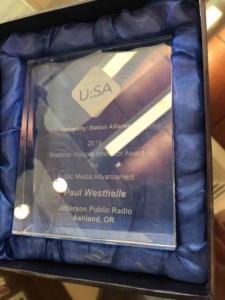JPR wins news reporting awards in regional Edward R. Murrow contest
The Jefferson Public Radio newsroom is among the winners of the 2020 regional Edward R. Murrow Awards. The Murrows are presented by the Radio Television Digital News Association (RTDNA) to recognize outstanding broadcast and online journalism.
JPR won in the Feature Reporting, Hard News and News Series categories in RTDNA’s NW small market division. That’s made up of public and commercial radio stations in Oregon, Washington, Idaho, Montana and Alaska. This is the third year running JPR has won in the Hard News category.
JPR was also recognized by the Associated Press Television and Radio Association (APTRA).The Associated Press award for News Feature was chosen from among submissions by small market public and commercial radio stations in the 13 western states, including California, Oregon and Washington.
“I’m thrilled to see the JPR news department recognized once again for its journalistic excellence,” stated JPR Executive Director Paul Westhelle. “Thanks to the support of our listeners, we’ve made a major investment during the last year expanding the capacity of our newsroom to create better, deeper local journalism for citizens of our region. These awards acknowledge that commitment as well as the dedication of the talented JPR journalists who work each day to create a better informed public.”
The RTDNA has been honoring outstanding achievements in electronic journalism with the Edward R. Murrow Awards since 1971. Awards are presented to news organizations whose work demonstrates the spirit of excellence that Murrow set as a standard for the profession of broadcast and digital journalism.
Listen to the winning entries:
Hard News
Bulldozers In The Wilderness: Are They Worth The Environmental Cost?
by Liam Moriarty
Federally designated wilderness areas are strictly protected. So it raised eyebrows last summer when fire managers brought bulldozers and other heavy equipment into wilderness areas to fight wildfires in Southern Oregon and Northern California.
News Feature
Ashland’s EJ Holland Continues Oregon Running Legacy
by Erik Neumann
At the State of Jefferson cross-country meet in Ashland’s Lithia Park, the tangy smell of trampled grass hangs in the air. Lanky teenagers sprint the last few hundred yards to the race finish line while parents and classmates cheer from the edge of the course.
(This story won both a Murrow and an APTRA award)
News Series
Oppressed By Wildfire
by April Ehrlich
Jefferson Public Radio spent months speaking to families in Northern California about how wildfires impact them. We found that wildfires leave the most long-lasting impacts on marginalized populations — including people of Latino and Native American descent, people who are homeless, and people with disabilities. The key issue is that wildfire response and preparation systems weren’t designed with these communities in mind.
Regional Murrow winners are automatically entered in the national Edward R. Murrow competition. National winners will be announced in June.
This story is reposted from Jefferson Public Radio








 “I’m honored to accept this award on behalf of Southern Oregon University and one of the most loyal and supportive public radio audiences in the nation,” Westhelle said. “JPR is blessed with a university licensee that truly understands the civic engagement opportunities and public service potential of operating an NPR affiliate.
“I’m honored to accept this award on behalf of Southern Oregon University and one of the most loyal and supportive public radio audiences in the nation,” Westhelle said. “JPR is blessed with a university licensee that truly understands the civic engagement opportunities and public service potential of operating an NPR affiliate.

